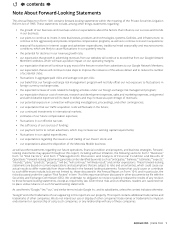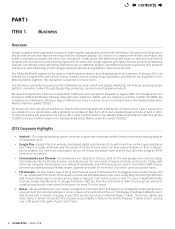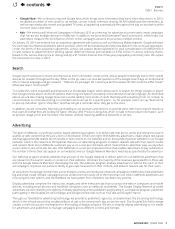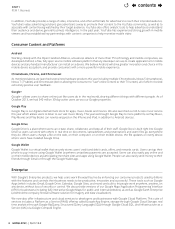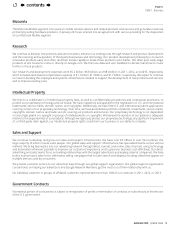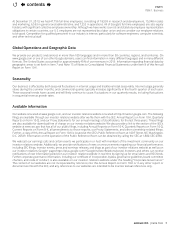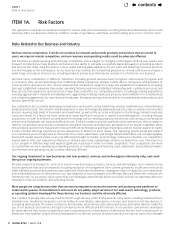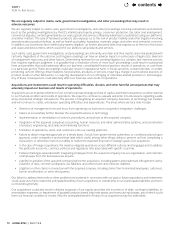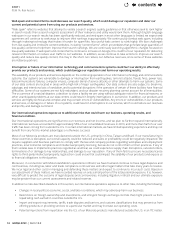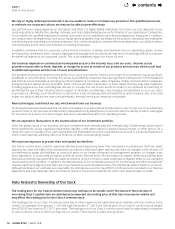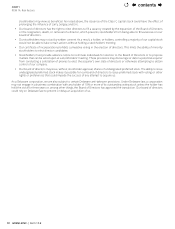Google 2013 Annual Report Download - page 17
Download and view the complete annual report
Please find page 17 of the 2013 Google annual report below. You can navigate through the pages in the report by either clicking on the pages listed below, or by using the keyword search tool below to find specific information within the annual report.11GOOGLE INC.
ITEM1A.RiskFactors
Our business depends on a strong brand, and failing to maintain and enhance our brand would hurt our ability to
expand our base of users, advertisers, Google Network Members, and other partners.
Thebrandidentitythatwehavedevelopedhassignicantlycontributedtothesuccessofourbusiness.Maintainingandenhancing
the “Google” brand is critical to expanding our base of users, advertisers, Google Network Members, and other partners. We
believe that the importance of brand recognition will increase due to the relatively low barriers to entry in the internet market.
Our brand may be negatively impacted by a number of factors, including data protection and security issues, service outages,
andproductmalfunctions.Ifwefailtomaintainandenhancethe“Google”brand,orifweincurexcessiveexpensesinthiseort,
ourbusiness,operatingresults,andnancialconditionwillbemateriallyandadverselyaected.Maintainingandenhancingour
brand will depend largely on our ability to be a technology leader and continue to provide high-quality innovative products and
services, which we may not do successfully.
A variety of new and existing U.S. and foreign laws could subject us to claims or otherwise harm our business.
We are subject to numerous U.S. and foreign laws and regulations covering a wide variety of subject matters. New laws and regulations
(or new interpretations of existing laws and regulations) may also impact our business. The costs of compliance with these laws and
regulations are high and are likely to increase in the future. Any failure on our part to comply with these laws and regulations can result
innegativepublicityanddiversionofmanagementtimeandeortandmaysubjectustosignicantliabilitiesandotherpenalties.
Furthermore, many of these laws were adopted prior to the advent of the internet and related technologies and, as a result, do
not contemplate or address the unique issues of the internet and related technologies. The laws that do reference the internet are
being interpreted by the courts, but their applicability and scope remain uncertain. For example, the laws relating to the liability of
providers of online services are currently unsettled both within the U.S. and abroad. Claims have also been, or may be, threatened
andledagainstusunderbothU.S.andforeignlawsfordefamation,invasionofprivacyandothertortclaims,unlawfulactivity,
patent, copyright and trademark infringement, or other theories based on the nature and content of the materials searched and
the ads posted by our users, our products and services, or content generated by our users. Moreover, current and new patent laws
suchasU.S.patentlawsandEuropeanpatentlawsmayaecttheabilityofcompanies,includingus,toprotecttheirinnovations
and defend against claims of patent infringement.
Inaddition,theDigitalMillenniumCopyrightActhasprovisionsthatlimit,butdonotnecessarilyeliminate,ourliabilityforcaching
or hosting, or for listing or linking to, third-party websites that include materials that infringe copyrights or other rights, so long as
we comply with the statutory requirements of this act. Any future legislation impacting these safe harbors may adversely impact
us. Various U.S. and international laws restrict the distribution of materials considered harmful to children and impose additional
restrictions on the ability of online services to collect information from minors. In the area of data protection, many states have
passedlawsrequiringnoticationtouserswhenthereisasecuritybreachforpersonaldata,suchasCalifornia’sInformation
PracticesAct.Wefacesimilarrisksandcostsasourproductsandservicesareoeredininternationalmarketsandmaybesubject
to additional regulations.
We are, and may in the future be, subject to intellectual property or other claims, which are costly to defend, could
Internet, technology, media, and other companies own large numbers of patents, copyrights, trademarks, and trade secrets and
frequently enter into litigation based on allegations of infringement or other violations of intellectual property rights. In addition,
patent holding companies may continue to seek to monetize patents they have purchased or otherwise obtained. As we have
grown, the intellectual property rights claims against us have increased and may continue to increase as we develop new products,
services, and technologies.
Wehavehadpatent,copyright,andtrademarkinfringementlawsuitsledagainstusclaimingthatcertainofourproducts,services,
and technologies, including Android, Google Search, Google AdWords, Google AdSense, Motorola products, Google Maps, Google
Books, Google News, Google Image Search, Google Chrome, Google Talk, Google Voice, and YouTube, among others, infringe the
intellectualpropertyrightsofothers.ThirdpartieshavealsosoughtbroadinjunctivereliefagainstusbylingclaimsinU.S.and
international courts and the U.S. International Trade Commission (ITC) for exclusion and cease and desist orders, which could
limit our ability to sell our products or services in the U.S. or elsewhere if our products or services or those of our customers
or suppliers are found to infringe the intellectual property subject to the claims. Adverse results in any of these lawsuits may
include awards of substantial monetary damages, costly royalty or licensing agreements (if licenses are available at all), or orders
preventingusfromoeringcertainfeatures,functionalities,products,orservices,andmayalsocauseustochangeourbusiness
practices, and require development of non-infringing products or technologies, which could result in a loss of revenues for
us and otherwise harm our business.
In addition, many of our agreements with our customers and partners, including certain suppliers, require us to indemnify them
for certain intellectual property infringement claims against them, which could increase our costs as a result of defending such
claims,andmayrequirethatwepaysignicantdamagesiftherewereanadverserulinginanysuchclaims.Suchcustomersand
partners may also discontinue the use of our products, services, and technologies, as a result of injunctions or otherwise, which
could result in loss of revenues and adversely impact our business. Moreover, supplier provided intellectual property indemnities
tous,whenobtainable,maynotcoveralldamagesandlossessueredbyusandourcustomersfromcoveredproducts.
contents


